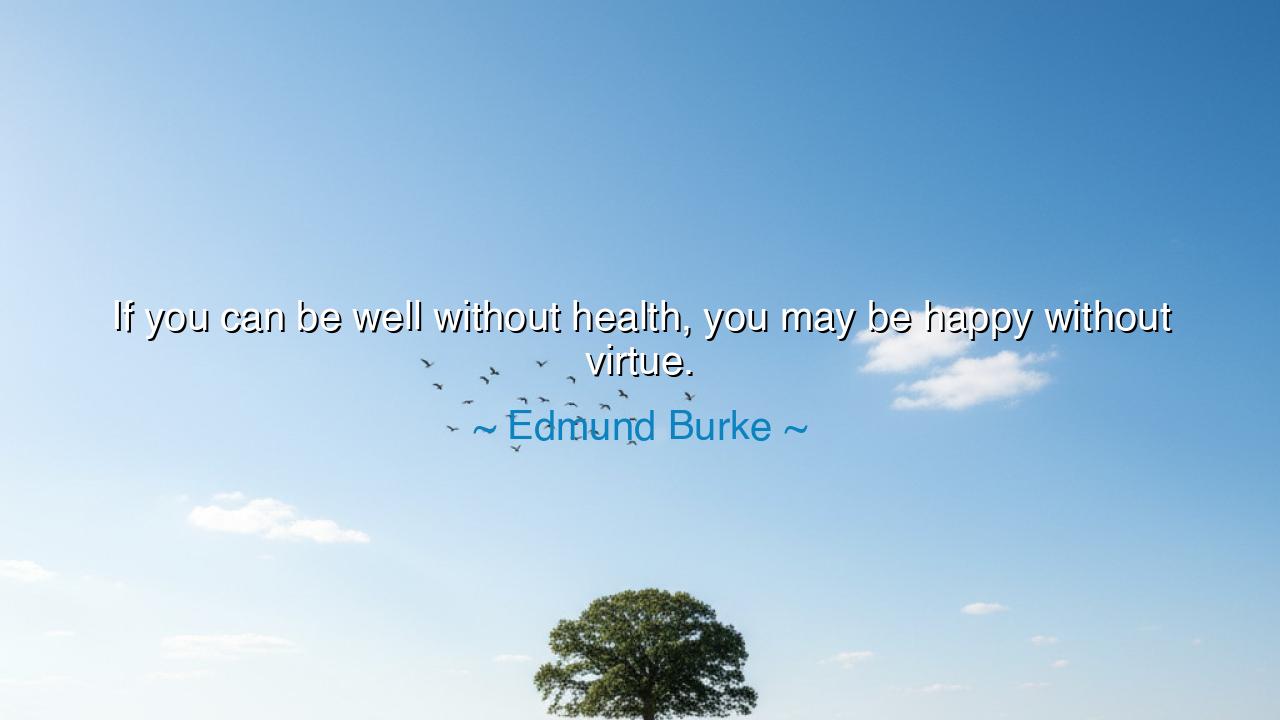
If you can be well without health, you may be happy without






“If you can be well without health, you may be happy without virtue.” — thus spoke Edmund Burke, the philosopher of conscience and civilization, whose words have echoed through centuries as a defense of moral truth. In this sharp and paradoxical saying, Burke does not jest — he warns. His message is as timeless as it is piercing: that health to the body is what virtue is to the soul. Just as one cannot truly claim to be well while disease eats away within, neither can one claim happiness if the heart is corrupted. For to separate happiness from virtue is to sever joy from its root, and to mistake illusion for peace.
Burke lived in an age of upheaval — an age when nations and men alike sought liberty without responsibility, pleasure without restraint, power without principle. It was during such times that he spoke these words, defending the eternal truth that virtue is not optional to the human condition. Just as health sustains life, virtue sustains meaning. To be “well without health” would be a mockery — a contradiction. The same, says Burke, is true for the soul that seeks happiness while scorning moral goodness. The one who pursues joy without virtue may smile, but it will be a hollow smile, one that crumbles in silence when the soul remembers its hunger for what is right.
The ancients understood this well. The philosophers of Greece and Rome — Socrates, Aristotle, Seneca — all declared that virtue is the highest good, for it aligns man’s spirit with the order of the universe. Wealth, pleasure, or fame may bring momentary delight, but only virtue brings enduring harmony, the peace that cannot be stolen by fortune or decay. In the same way, health is not simply the absence of pain, but the balance of the body’s forces — the quiet harmony that allows life to flourish. Burke’s wisdom joins these truths: just as health is the foundation of strength, virtue is the foundation of joy. To claim one without the other is to live in shadow and call it sunlight.
History offers us many lessons in this regard. Consider the story of Emperor Nero, who possessed every worldly pleasure — power, wealth, music, and art — yet descended into madness and ruin. He mistook indulgence for happiness, cruelty for strength, and flattery for love. His empire burned, and with it, his soul. Nero was like a man who paints over disease instead of healing it — outwardly splendid, inwardly rotting. His happiness without virtue proved false, just as a man’s claim to wellness means nothing if sickness festers within. In contrast, think of Marcus Aurelius, who ruled with humility and justice, and though burdened by sorrow and loss, found serenity in virtue. His life reminds us that happiness born of goodness endures even through suffering, for it is rooted in truth.
Burke’s metaphor of health is no accident. Health is invisible until it is lost, yet all life depends on it. So it is with virtue. The moral fabric of both the individual and society is often unseen — a silent order holding everything together. When it frays, chaos enters. The sickness of the soul spreads quickly: greed, envy, deceit, cruelty — all these are symptoms of a deeper corruption. To imagine that one can be “happy without virtue” is to live in denial, to mistake the fever of pleasure for the warmth of health. But when the fever passes, emptiness remains.
The lesson is clear: true well-being, whether of body or of spirit, cannot be faked. Cultivate virtue as you would protect your health — daily, diligently, with care and discipline. Feed the soul with honesty, kindness, and courage as you feed the body with nourishment. Guard against the poisons of vanity and corruption as you would against disease. For just as exercise strengthens the flesh, good deeds strengthen the heart. And as neglect brings illness, so does moral idleness bring decay. The wise know that virtue and happiness are not two paths, but one — walk it, and both peace and purpose will follow.
So, my children of thought, remember Burke’s immortal teaching: health without virtue is an illusion, and happiness without goodness is a lie. Do not chase the fleeting glow of pleasure while your inner being sickens. Tend to your conscience as you tend to your breath. For the body may survive without wealth, but it cannot thrive without health; and the soul may live without fame, but it cannot rejoice without virtue. Choose, then, the path of truth — though it may be steep, it leads to the summit of joy that does not fade, the joy that is both healthy in the body and whole in the soul.






AAdministratorAdministrator
Welcome, honored guests. Please leave a comment, we will respond soon